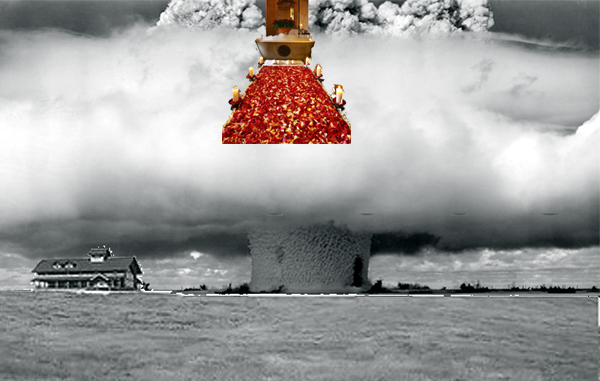 Out there in the milky skies of a not-so-distant horizon I see the first sparkles of a mammoth explosion rising up from the yet slimy volcanoes just below ground: the travel bubble bursting.
Out there in the milky skies of a not-so-distant horizon I see the first sparkles of a mammoth explosion rising up from the yet slimy volcanoes just below ground: the travel bubble bursting.
Oh in this dismal world might also a Ukrainian nuclear plant or the world’s oldest democracies shatter like a CGI commercial for relieving your psoriasis, but truly you adventuresome soul, your airline ticket and safari price might soon be crumbling to pieces. Don’t blame me if I’m wrong. It’s happened before.
Breaking eggs, casting flour to the hurricanes and blowing out tires, airline fares have increased a third in the last year. A third. A third. For the minuscule number of adventuresome travelers who actually budget their journeys, that means the annual vacation must be replaced with a local cooking class which if you live in the Midwest means another way to fry grits.
If there are large bodies of water between you and your vacation destination you’ll likely be on an airplane to get there. The guide greeting you with jaundice caused by Covid, the late transport driver who seconds as the local Uber, and the cute little cottage which now makes you fill up the propane tank before you cook are all charging double pre-Covid.
Or more to my expertise, the average cost for an American traveling to East Africa for a safari has risen from around $680/day/person to just over $1000/day/person. Hey, we bettered the airlines!
Just give a quick web check to some of the once better safari companies: Micato, Abercrombie & Kent, Audley Travel … retail prices now being asked for 2023 are double what was asked for 2020.
This horrendous increase did not reflect a comparable increase of prices on the ground. It reflected a psycho-business technique to recover loss by exploiting the gullibility of the rich. And clever as they are it doesn’t take long until everybody underneath them sees the scam and increases their prices, too, pushing more and more upwards pressure on price!
I don’t mind that so much. My guys ultimately get paid more, the Arusha wine distributor can build the second warehouse and much needed spare parts finally arrive. But hey, this is backwards. This is trickle-down richness and like any trickle-down economic model it will eventually blow up.
This time vendors are really panicked or really bankrupt, or both, but they are playing with fire. Nothing in East African business investment has ever made much sense. In recessions, prices increased. In periods of expansion, prices increased. In coups and natural disasters, prices increased.
The East African businessman never understood down. And this pattern of repeated market arrogance has shrunk the East African safari market vis-a-vis almost any other market except farm tours to Bulgaria, decade after decade.
Good companies accustomed to providing good services to larger numbers of people like Sopa Lodges are disappearing. Everything is getting smaller, finer, richer because that’s the only market segment that responds to the weird inflation exploitation of an upside down trickle-down rich business model.
There is some frightening rationale to all of this. The market is technically so small that East African investors have developed a sensitivity to disposable income as acute as a jumping spider’s.
Every market upheaval, whether caused by hurricanes or coups or Liz Truss’ reveals the class-climbers looking for a deal. Not the home buyer, not the mother of eight on her app in the grocery store, but the middle-upper wage earner capable of getting out of Tampa in time, the banker who funded coastal development instead of a Vanguard mutual fund, and the pensioner who had prepaid his kids’ college with a legacy name.
But these price-checkers for the best lion watching are too clever by half. The spider ain’t idle. It’s woven a web.
Each market shift in my life time has made the rich, richer, and that silent spider with its gigantic eyes ready to jump out of the corner of the basement was watching. It use to have to eat six people, then three, now only one, because those people keep getting fatter and fatter.
So remarkably the exceedingly short-term strategy works: For the smaller, more luxurious. The good midmarket or downmarket company is squashed away. Governments help. Just the Tanzanian government fees for overnighting in a national park are today per night more than the average daily TOTAL cost of a safari in 2012!
So suddenly what is the poor East African investor supposed to do? Go bankrupt?
Well, yes, actually. That’s normally the way failing businesses work. Besides you can lay just so many rose pedals up to the four-poster bath before they hide the bath mat and the sap slips. And that prospect sparkles in the not-so-distant horizon like an ice-cube clinking in an otherwise empty crystal glass.
[For the important link in this post see the original blog at africaanswerman.com.]